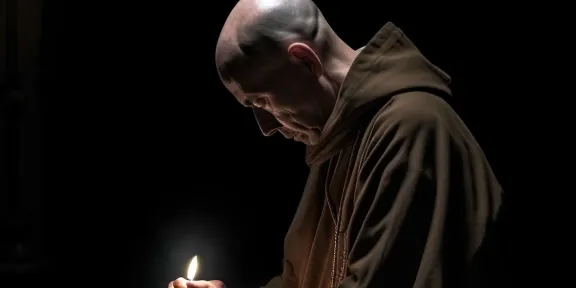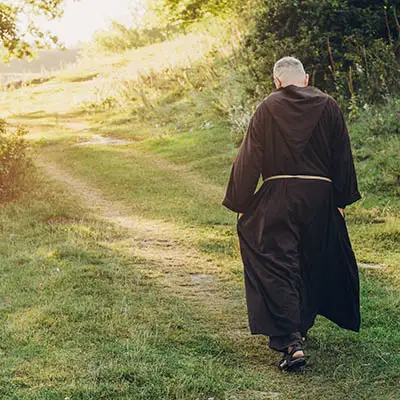
Thomas Merton
Thomas Merton Frequently Asked Questions
Who was Thomas Merton?
Thomas Merton was a Trappist monk, writer, theologian, mystic, and social activist who became one of the most well-known and influential Catholic authors of the 20th century.
When and where was Thomas Merton born?
Thomas Merton was born on January 31, 1915, in Prades, Pyrénées-Orientales, France.
What is Thomas Merton known for?
Thomas Merton is known for his writings on spirituality, contemplative prayer, social justice, and the relationship between Eastern and Western religions.
What inspired Thomas Merton to become a monk?
Thomas Merton was inspired to become a monk after a profound spiritual experience he had while visiting a Trappist monastery in Kentucky in 1941.
What was the title of Thomas Merton's autobiography?
Thomas Merton's autobiography is titled "The Seven Storey Mountain," which was published in 1948 and became a bestseller.
Where did Thomas Merton live as a monk?
Thomas Merton lived as a monk at the Abbey of Gethsemani, a Trappist monastery in Kentucky, where he entered in 1941 and remained until his death in 1968.
What is Thomas Merton's most famous book?
One of Thomas Merton's most famous books is "New Seeds of Contemplation," first published in 1961, which explores themes of spirituality, prayer, and contemplation.
Did Thomas Merton engage in social activism?
Yes, Thomas Merton was a committed social activist who spoke out against war, racism, poverty, and other social injustices. He was involved in the civil rights movement and the peace movement.
Did Thomas Merton have an interest in Eastern religions?
Yes, Thomas Merton had a deep interest in Eastern religions, particularly Zen Buddhism. He believed that there were similarities between Eastern and Western spiritual traditions.
How did Thomas Merton die?
Thomas Merton died on December 10, 1968, in Bangkok, Thailand, after accidentally being electrocuted by a faulty electric fan in his hotel room.
Was Thomas Merton a prolific writer?
Yes, Thomas Merton was a prolific writer who authored more than 70 books on spirituality, contemplation, social justice, poetry, and other topics.
Did Thomas Merton have any famous friends?
Thomas Merton had many famous friends and acquaintances, including the Dalai Lama, Dorothy Day, Daniel Berrigan, and Bob Dylan.
What impact did Thomas Merton have on the Catholic Church?
Thomas Merton had a significant impact on the Catholic Church by encouraging a renewal of contemplative prayer and spirituality among Catholics and fostering dialogue between different religious traditions.
Was Thomas Merton involved in the interfaith movement?
Yes, Thomas Merton was involved in the interfaith movement and believed in the importance of dialogue and understanding between different religious traditions.
Did Thomas Merton write about the environment?
Yes, Thomas Merton wrote about the environment and the importance of caring for the earth. He believed in the interconnectedness of all living beings.
What was Thomas Merton's stance on war?
Thomas Merton was a strong advocate for peace and spoke out against war and violence. He believed in the principles of nonviolence and pacifism.
How did Thomas Merton's writings impact his readers?
Thomas Merton's writings have had a profound impact on his readers by inspiring them to deepen their spiritual lives, engage in social justice issues, and seek unity among different religious traditions.
Did Thomas Merton have a specific prayer practice?
Thomas Merton practiced contemplative prayer, a form of prayer that involves silence, stillness, and openness to the presence of God.
What was the legacy of Thomas Merton?
The legacy of Thomas Merton includes his writings, which continue to inspire and challenge readers, as well as his commitment to peace, justice, and interfaith dialogue.
How is Thomas Merton remembered today?
Thomas Merton is remembered today as a spiritual pioneer, a voice for peace and justice, and a bridge-builder between different religious traditions. His influence continues to be felt in the realms of spirituality, social activism, and interfaith dialogue.
Who was Thomas Merton?
Thomas Merton (1915-1968) was a Trappist monk, writer, theologian, mystic, and social activist. He is best known for his spiritual writings and for promoting interfaith dialogue.
Where was Thomas Merton born?
Thomas Merton was born in Prades, France in 1915.
When did Thomas Merton become a Trappist monk?
Thomas Merton entered the Abbey of Gethsemani in Kentucky in 1941 and took his vows as a Trappist monk in 1944.
What are some of Thomas Merton's most famous books?
Some of Thomas Merton's most famous books include "The Seven Storey Mountain," "New Seeds of Contemplation," and "No Man is an Island."
What is Thomas Merton known for in the Christian spiritual tradition?
Thomas Merton is known for his writings on contemplative prayer, solitude, and the importance of silence in the Christian spiritual life.
Did Thomas Merton have any interactions with other religious traditions?
Thomas Merton was a pioneer in fostering dialogue between different religious traditions, particularly between Christianity and Eastern religions such as Buddhism.
Did Thomas Merton have any political or social activism?
Thomas Merton was an outspoken critic of war, nuclear weapons, and social injustice. He was involved in the civil rights movement and spoke out against racism and poverty.
How did Thomas Merton die?
Thomas Merton died in 1968 in a tragic accident in Thailand, where he was attending a conference on East-West monastic dialogue.
What is Thomas Merton's legacy?
Thomas Merton's legacy includes his contributions to Christian spirituality, his role in promoting interfaith dialogue, and his influence on social activism.
Was Thomas Merton ever controversial?
Some of Thomas Merton's writings and actions were controversial during his lifetime, particularly his exploration of Eastern spirituality and his criticism of institutionalized religion.
What impact did Thomas Merton have on the Catholic Church?
Thomas Merton's writings and teachings have had a significant impact on the Catholic Church, particularly in the areas of contemplative prayer and social justice.
Did Thomas Merton have a significant influence on modern spirituality?
Yes, Thomas Merton is considered one of the most important spiritual writers of the 20th century and has had a profound influence on modern spirituality.
Was Thomas Merton interested in ecumenism?
Yes, Thomas Merton was a strong advocate of ecumenism and believed in the importance of unity among different Christian denominations.
Did Thomas Merton have any famous disciples or followers?
Thomas Merton had a wide circle of friends and followers, including prominent writers, theologians, and activists who were inspired by his teachings.
How did Thomas Merton's background influence his spiritual journey?
Thomas Merton's early experiences, including his conversion to Catholicism and his time in a Trappist monastery, strongly shaped his spiritual path and writings.
What are some key themes in Thomas Merton's writings?
Some key themes in Thomas Merton's writings include contemplation, silence, solitude, social justice, the unity of all creation, and the search for God in everyday life.
Was Thomas Merton involved in any major theological debates during his lifetime?
Thomas Merton was involved in discussions on various theological topics, such as the nature of prayer, the relationship between faith and reason, and the role of mysticism in the modern world.
How did Thomas Merton view the role of the individual in society?
Thomas Merton believed in the importance of personal transformation and spiritual growth as a means to effect positive change in society.
Did Thomas Merton have any struggles or doubts in his spiritual journey?
Thomas Merton was open about his struggles and doubts in his spiritual journey, particularly in his efforts to balance the demands of monastic life with his desire for solitude and contemplation.
What is the best way to start reading Thomas Merton's works?
A good starting point for reading Thomas Merton's works is his autobiography, "The Seven Storey Mountain," which provides a glimpse into his spiritual journey and contemplative insights. Other recommended books include "New Seeds of Contemplation" and "No Man is an Island."
Who was Thomas Merton?
Thomas Merton was a Trappist monk, writer, theologian, mystic, and social activist born in France in 1915. He is best known for his spiritual writings, particularly his autobiography "The Seven Storey Mountain."
When and where was Thomas Merton born?
Thomas Merton was born on January 31, 1915, in Prades, France.
What is Thomas Merton known for?
Thomas Merton is known for his writings on spirituality, contemplation, and social justice. His autobiography, "The Seven Storey Mountain," is one of his most famous works.
Where did Thomas Merton live?
Thomas Merton lived as a Trappist monk at the Abbey of Gethsemani in Kentucky for most of his adult life.
What is the Abbey of Gethsemani?
The Abbey of Gethsemani is a Trappist monastery located in Kentucky where Thomas Merton lived and worked as a monk from 1941 until his death in 1968.
How did Thomas Merton die?
Thomas Merton died on December 10, 1968, in Bangkok, Thailand, where he was attending an interfaith conference. He accidentally touched an electric fan while stepping out of the shower and was electrocuted.
What is Thomas Merton's most famous book?
Thomas Merton's most famous book is "The Seven Storey Mountain," an autobiography that chronicles his spiritual journey and conversion to Catholicism.
Did Thomas Merton have any other notable works?
Yes, Thomas Merton wrote over 70 books on various topics, including spirituality, contemplation, social justice, and interfaith dialogue. Some of his other notable works include "New Seeds of Contemplation" and "No Man is an Island."
Was Thomas Merton involved in social activism?
Yes, Thomas Merton was an active voice for peace and social justice. He spoke out against war, poverty, racism, and other social injustices of his time.
Did Thomas Merton have any influence on the Catholic Church?
Yes, Thomas Merton's writings on spirituality and contemplation have had a significant influence on the Catholic Church and the broader Christian community.
How did Thomas Merton's upbringing influence his spiritual journey?
Thomas Merton was raised in a non-religious household but later converted to Catholicism as a young man. His spiritual journey was greatly influenced by his upbringing and his search for meaning and truth.
Did Thomas Merton correspond with other spiritual leaders?
Yes, Thomas Merton corresponded with a wide range of spiritual leaders, including the Dalai Lama, Thich Nhat Hanh, and Dorothy Day. These interactions helped shape his views on interfaith dialogue and spirituality.
Was Thomas Merton a hermit or a social activist?
Thomas Merton was both a hermit and a social activist. He valued solitude and contemplation but also believed in the importance of social justice and activism.
What is the Thomas Merton Center?
The Thomas Merton Center is an educational and resource center dedicated to promoting the works and teachings of Thomas Merton. It is located in Pittsburgh, Pennsylvania.
Did Thomas Merton have a significant impact on the field of spirituality?
Yes, Thomas Merton is widely regarded as one of the most important spiritual writers of the 20th century. His writings on contemplation, prayer, and mysticism have inspired readers of all faiths.
Did Thomas Merton travel extensively during his lifetime?
Yes, Thomas Merton traveled extensively throughout his life, visiting countries such as France, Italy, England, Sri Lanka, and India. His travels influenced his writings and his views on global peace and understanding.
What is the legacy of Thomas Merton?
The legacy of Thomas Merton is one of contemplation, spirituality, and social activism. His writings continue to inspire people to search for deeper meaning and to work for a more just and peaceful world.
Was Thomas Merton involved in the civil rights movement?
Yes, Thomas Merton was a vocal supporter of the civil rights movement in the United States. He spoke out against racism and segregation and advocated for equality and justice for all people.
How did Thomas Merton view the relationship between spirituality and social action?
Thomas Merton believed that spirituality and social action were intimately connected. He saw contemplation as a source of inspiration and energy for social justice work.
What quotes is Thomas Merton known for?
Thomas Merton is known for many memorable quotes, such as "Love is our true destiny. We do not find the meaning of life by ourselves alone – we find it with another." and "The beginning of love is the will to let those we love be perfectly themselves, the resolution not to twist them to fit our own image."

